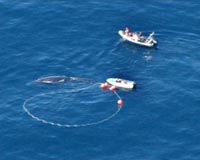| . |  |
. |
Funchal, Portugal (AFP) June 25, 2009 The International Whaling Commission's annual conference ended in disarray Thursday, keeping in place a ban on commercial whaling amid deep rifts between hunters and conservationists. The commission's new chairman said the IWC should now question its role as the conference on the Portuguese island of Madeira wrapped up a day early with delegates agreeing only to extend negotiations on whaling for another year. "We have to re-establish a consensus on what the IWC is and should do, and there are at least two contradictory perceptions to answer that question," said Cristian Maquieira, who was elected chairman during the talks this week. Joji Morishita, a senior official with the Japanese delegation, said the commission should approve limited commercial whaling by next year, adding: "Without that... the future of the IWC is seriously in doubt." Convervation groups were also angry, with Greenpeace saying: "After 12 months of talking... all the IWC has achieved is another 12 months of talking." The Whale and Dolphin Conservation Society (WDCS) said it "deeply laments the fact that not a single of the important whaling topics was resolved." The IWC was set up in 1946 by 15 whale-hunting nations in order to manage a whale population that was being threatened by the fishing industry. The body now has 85 members and has taken an increasingly conservationist approach. In 1986, it instituted a ban on commercial whaling that still stands today. The commission has been deadlocked in recent years by divisions between countries such as Japan that say the dangers of whaling are exaggerated and other nations like Australia which want the whaling ban to be kept in place. Maquieira said a compromise was "not impossible" but would be very tough. In a further sign of divisions, delegates failed to agree Thursday on whether Denmark could resume limited hunting of humpback whales off the coast of Greenland as part of "aboriginal" subsistence hunting by local communities. "As it has not been possible to reach a consensus on Denmark's request, an extraordinary meeting will be organised to discuss the matter again," Portuguese commissioner Jorge Palmeirim told AFP. "There is no other option but to postpone the matter," he said. Denmark had proposed to hunt 10 humpbacks a year off Greenland, a semi-autonomous Danish territory. Environmental campaigners, who are against Denmark's proposal, were angered by the failure of the countries present to vote on the issue. Commercial hunting of humpbacks has been banned since 1966 but Greenland continued to capture the marine mammals until 1987, when the moratorium was extended to "aboriginal" subsistence hunting. Some European delegates at the IWC conference had deemed the proposal unacceptable, arguing that Denmark had failed to prove that Greenland's native Inuit populations had greater need of whale meat.
related report The Danish proposal to hunt 10 humpbacks a year off Greenland, a semi-autonomous Danish territory, was put to the annual conference of the International Whaling Commission (IWC). But delegates at the key meeting, held this year on the Portuguese island of Madeira, could not agree on the matter. "As it has not been possible to reach a consensus on Denmark's request, an extraordinary meeting will be organised to discuss the matter again," Portuguese commissioner Jorge Palmeirim told AFP. "There is no other option but to postpone the matter," he added. No date had yet been fixed for the new meeting, Palmeirim said Environmental campaigners, who are against Denmark's proposal, were angered by the failure of the countries present to vote on the issue. "We're pleased that the proposal from Denmark to kill 10 humpback whales in west Greenland has not been adopted," said Nicolas Entrup, spokesman for the Whale and Dolphin Conservation Society. "But the decision to have no vote at this meeting is outrageous." Denmark has proposed to hunt humpbacks in the framework of "aboriginal" subsistence hunting, whereby the whales are caught to support local communities. Commercial hunting of humpbacks has been banned since 1966 but Greenland continued to capture the marine mammals until 1987, when the moratorium was extended to "aboriginal" subsistence hunting. Denmark put its request to delegates on Tuesday, asking to hunt an annual quota of 10 humpbacks from 2010-2012. As compensation, Danish commissioner Ole Samsing said the number of minke whales hunted would be reduced from 200 to 178. Some European delegates at the IWC conference had deemed the proposal unacceptable. They said it would increase the amount of whale meat brought it, but it had not been demonstrated that Greenland's Inuits had greater need of the meat. There are 85 countries in the IWC, which has for some years been trying to come to a new compromise on whale hunting and conservation. Share This Article With Planet Earth
Related Links Follow the Whaling Debate
 'Bycatch' Whaling A Growing Threat To Coastal Whales
'Bycatch' Whaling A Growing Threat To Coastal WhalesNewport OR (SPX) Jun 26, 2009 Scientists are warning that a new form of unregulated whaling has emerged along the coastlines of Japan and South Korea, where the commercial sale of whales killed as fisheries "bycatch" is threatening coastal stocks of minke whales and other protected species. Scott Baker, associate director of the Marine Mammal Institute at Oregon State University, says DNA analysis of whale-meat product ... read more |
|
| The content herein, unless otherwise known to be public domain, are Copyright 1995-2009 - SpaceDaily. AFP and UPI Wire Stories are copyright Agence France-Presse and United Press International. ESA Portal Reports are copyright European Space Agency. All NASA sourced material is public domain. Additional copyrights may apply in whole or part to other bona fide parties. Advertising does not imply endorsement,agreement or approval of any opinions, statements or information provided by SpaceDaily on any Web page published or hosted by SpaceDaily. Privacy Statement |